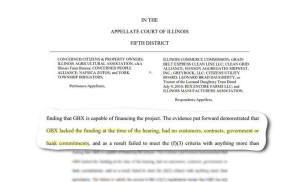State appeals court tosses proposal for new transmission line in central
Illinois
 Send a link to a friend
Send a link to a friend
[August 17, 2024]
By ANDREW ADAMS
Capitol News Illinois
aadams@capitolnewsillinois.com
 An appeals court last week reversed state regulators’ approval of a
permit for the Illinois portion of an 800-mile, high-voltage
transmission line, setting up a possible fight at the state’s Supreme
Court. An appeals court last week reversed state regulators’ approval of a
permit for the Illinois portion of an 800-mile, high-voltage
transmission line, setting up a possible fight at the state’s Supreme
Court.
The Grain Belt Express, or GBX, is owned by Chicago-based Invenergy and
is meant to carry renewable electricity generated by wind farms. It
would run through parts of Kansas, Missouri and Illinois before
terminating just over the Indiana border.
Its backers say the project is a key piece of infrastructure that’s
needed to boost renewable energy in the region as well as deliver
billions in savings to electricity customers over 15 years.
The company received approval for a key permit from the Illinois
Commerce Commission in March last year, but the 5th District Appellate
Court overruled that decision last week.
Justice James Moore, writing the unanimous opinion for the three-judge
panel, said the issue with the ICC’s permit is primarily a lack of
evidence that its owners can actually pay for the development.

“Ultimately, there was not substantial evidence put forth to support the
Commission’s finding that GBX is capable of financing the project,”
Moore wrote. “The evidence put forward demonstrated that GBX lacked the
funding at the time of the hearing, had no customers, contracts,
government or bank commitments.”
Moore also noted the parties involved in the case “agree on very little”
about the underlying law authorizing companies like Invenergy to build
these transmission lines.
That law was approved by the General Assembly in 2021 as part of the
Climate and Equitable Jobs Act, a broad legislative package that was
meant to decrease the state’s reliance on fossil fuels and eliminate
greenhouse gas emissions from electricity generation by 2045.
Proponents of the Grain Belt Express point to this reading of CEJA as a
threat to other renewable energy projects.
“Today’s ruling completely misinterprets law and threatens billions in
energy cost savings for Grain Belt Express consumers,” Invenergy
Director of Public Affairs Dia Kuykendall said Friday. “The erroneous
ruling has far-reaching implications beyond Grain Belt Express and
contradicts the State's efforts to secure a reliable and affordable
clean energy future.”
Kuykendall also said the company will “immediately appeal” the decision
to the Illinois Supreme Court.
The decision was also criticized by representatives of the Illinois
Manufacturers’ Association, Laborers’ International Union and Illinois
Environmental Council.
“We need this transmission infrastructure to bring renewable energy
online,” IEC Energy Policy Director Samira Hanessian said in an
interview.

[to top of second column]
|

An appeals court judge reversed a regulatory decision to approve a
central Illinois transmission line project last week. (Capitol News
Illinois illustration by Andrew Adams)

In an October 2023 study, the U.S. Department of Energy found that the
Midwest will need to more than double its mileage of high-voltage
transmission lines by 2040, assuming a moderate increase in electricity
needs and high adoption rates of renewable energy.
A similar appeals court ruling overturning an ICC permitting decision in
2015 nearly killed the development before it was sold to Invenergy.
The Illinois Farm Bureau, a lobbying and advocacy group representing
farmers, has been a driving force in the legal fight against the
transmission line. It was joined by several smaller groups of landowners
and farmers who organized opposition to the project independently.
Laura Harmon, associate counsel for the Illinois Farm Bureau, said the
organization doesn’t oppose all transmission line projects, noting that
many are backed by public utilities and are “vetted based on need,
reliability.”
“This one was different,” she said. “We had a project with no wind
farms, no customers.”
That introduced uncertainty for farmers who may be asked to sign
easements to allow the company to build on their property, which could
potentially cloud the title for that land.
“Depending on the language of the easement, it may not be void if that
project is never built,” she said.
CEJA does not name Grain Belt but says a project of its magnitude “shall
be deemed” a public use line, giving the company the ability to invoke
eminent domain if needed – a policy opposed by many farmers and large
landowners.
The law includes voltage and capacity parameters and requires any
“qualifying direct current project” to pass through nine counties along
the proposed route of the Grain Belt Express project. Those counties are
Pike, Scott, Greene, Macoupin, Montgomery, Christian, Shelby, Cumberland
and Clark.

The Farm Bureau contends that the provision at issue in the case was
added as unconstitutional “special legislation” meant to provide a way
to benefit the Grain Belt project specifically.
In the decision handed down Thursday siding with the Farm Bureau, the
justices explicitly declined to rule on that argument, leaving it
legally untested.
Grain Belt and its parent company have 35 days after the appeals court
ruling to request the Supreme Court to take up the case. In 2022, the
most recent year for which data is available, the Illinois Supreme Court
only accepted about 7 percent of petitions to appeal filed.
Capitol News Illinois is
a nonprofit, nonpartisan news service covering state government. It is
distributed to hundreds of print and broadcast outlets statewide. It is
funded primarily by the Illinois Press Foundation and the Robert R.
McCormick Foundation, along with major contributions from the Illinois
Broadcasters Foundation and Southern Illinois Editorial Association. |